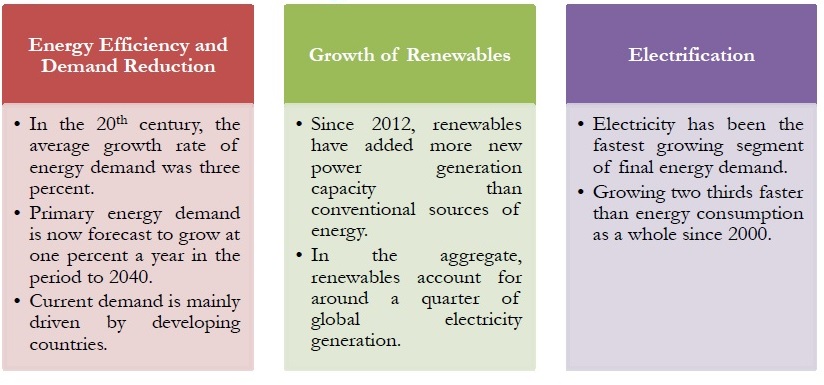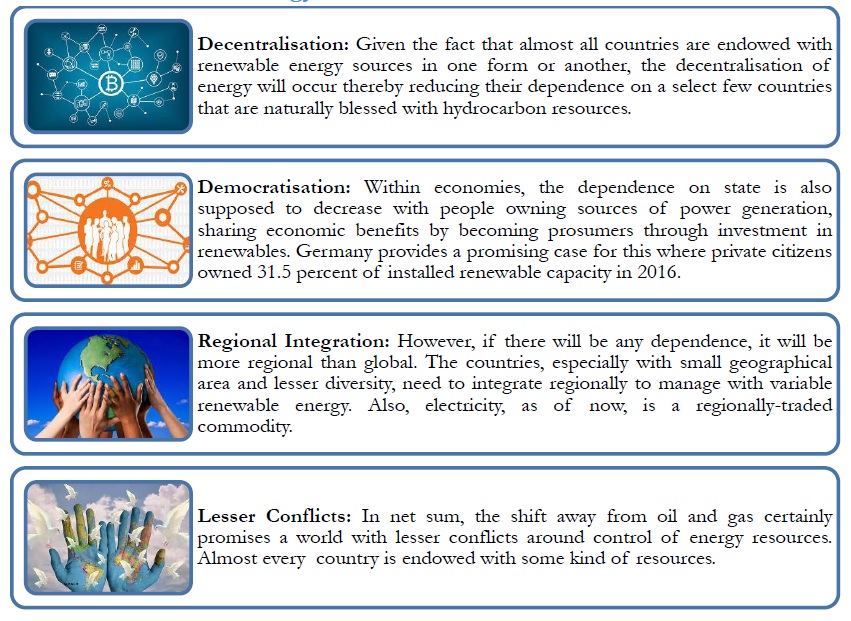
Dear Reader,
The seventh edition of Spotlight looks at Implications of Global Energy Transition on World Geopolitics and opportunities for Asia.
The Inseparable Interrelation between Energy and Geopolitics
Oil and natural gas undeniably, have had an important role in shaping economies, bringing prosperity to countries. However, it has not been without downsides. Hydrocarbons have also contributed to carbon emissions and ambient air pollution in cities. Moreover, oil and gas have also commanded a considerable impact on global geopolitics. Countries have forged alliances and waged wars against each other, with changing demand-supply equation and impatience to achieve energy security. Following the COP 21 agreement in Paris, a major energy transition has picked pace with countries shifting to renewables in response to climate change. With oil and gas controlling global geopolitics for almost a century, such transition may substantially impact the current dynamics.
Key Features of Current Energy Transition

Features of Current Energy Transition

Challenges
- Early mover’s advantage: China is a clear winner in this case which has published the highest number of patents in renewable space and accounted for 45 percent of global investment in renewables in 2017. The technology dominance of a few players might create heavy dependence again on a few countries and players which can stifle competition and innovation. Therefore, countries need to develop policies to create a competitive manufacturing value chain around technologies within a fair and rule-based trading system.
- Interdependency and use of power as a geopolitical tool: The idea of developing an ultra-high voltage grid is also being championed that will connect all the continents with a ‘Super Grid’. However, that again raises concerns regarding interdependency and the use of power as a geopolitical tool.
- Control of critical resources: There is also apprehension among countries towards their ability to access minerals such as Cobalt, Lithium and Rare Earths and these being used as a geopolitical tool. The view received major credence in 2008 when China restricted the supply of rare earths to foreign buyers. Recycling and findings related to alternative chemistries may help as a deterrent to such controlled access.
- The financial instability of oil and natural gas exporting economies: The biggest challenge to the transition is managing economic instability faced by oil and natural gas exporting countries that employ fossil fuel rents to finance socio-economic developments and diversification. Unless these countries reinvent their economies, they are vulnerable to political and social destabilisation and loss of geopolitical influence.
- Loss of jobs: Globally, the transition will have an impact on workers and communities who are dependent on fossil fuels. Thus, the transition needs to be a just transition and should not leave anyone behind.
Opportunity for Asia: Could Global Transition and its evolution be a precursor to shift of pivot of energy governance to Asia from the Middle East and North America?
The transition presents an incredible opportunity for Asia, commanding 60 percent of the population spread across energy-guzzling economies. With the saturation of energy demand in Organisation for Economic Cooperation and Development (OECD) countries, Asia has emerged as the largest demand centre for hydrocarbons with China and India alone consuming 20 percent of oil, which will only grow in the future.
Additionally, these two countries have also been running one of the most ambitious plans in renewables. For instance, India has now set a target of installing electricity generation capacity through renewables worth 500 GW by 2030. On the other hand, China already has one-fourth of global capacity. Subsequent investment, with a major proportion already in the pipeline and existing control on technology, will only improve Asia’s position in Renewable space. However, to achieve fruitful outcomes, greater regional integration and effective functioning of organisations, such as Association of Southeast Asian Nations (ASEAN), Bay of Bengal Initiative for Multi-Sectoral Technical and Economic Cooperation (BIMSTEC), and Brazil, Russia, India, China, and South Africa (BRICS) will be necessary.
Some Take Away Thoughts?
- Would the ongoing energy transformation, apart from clear benefits related to air pollution, climate change and sustainable development, be able to provide a more stable world with fewer conflicts?
- How would the new geopolitical order and shape of alliances look like in the backdrop of enhanced energy security and self-reliance of countries?
- Would the economic fraternities as a collective effort, be able to manage proactively the economic losers and winners in the transition, to avoid any social and political crisis in the future?
